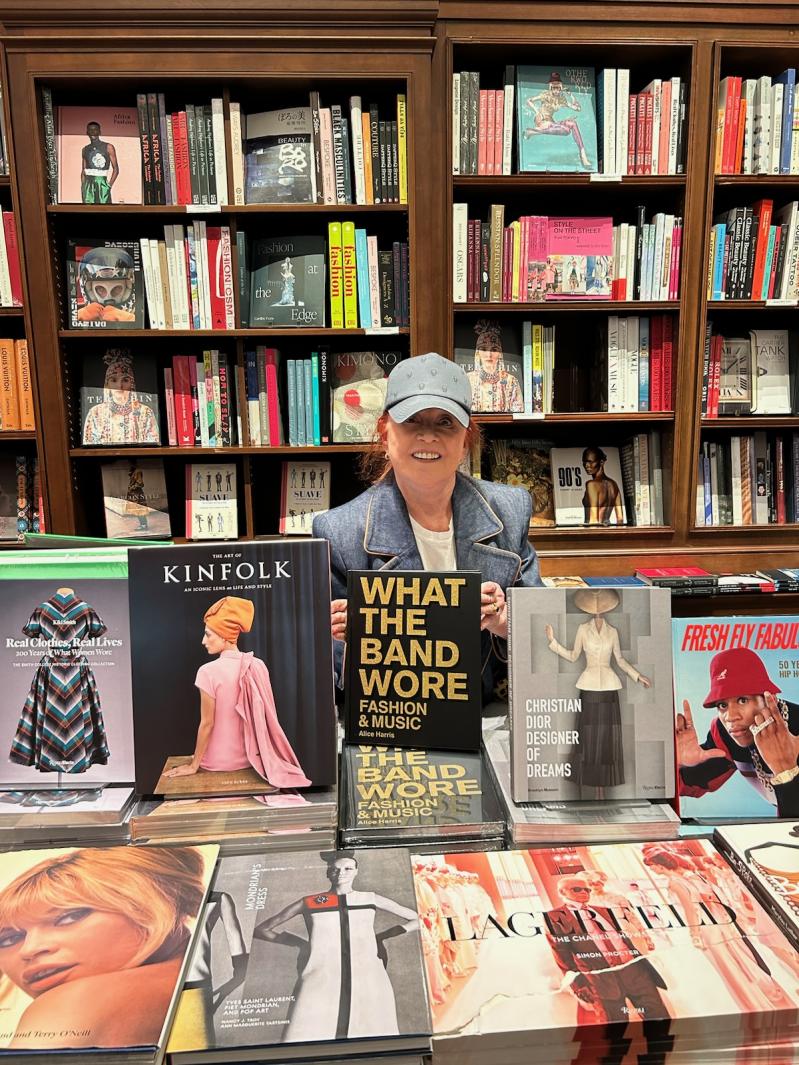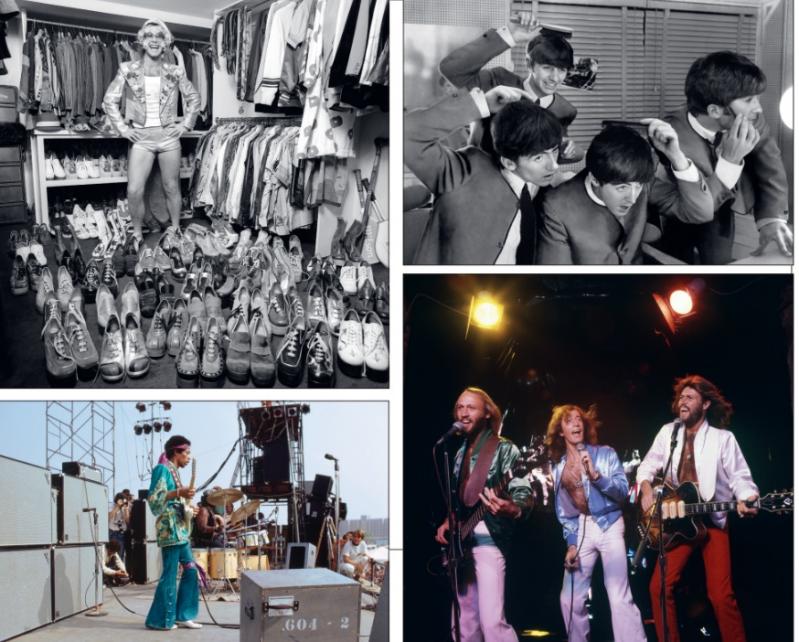"Stop, in the name of . . . sequins!"
This witty iteration of those famous lyrics from that famous 1965 song by Diana Ross and the Supremes perfectly encapsulates the ethos behind "What the Band Wore," a photography book by Alice Harris. Glitter, sequins, luminous black leather, beads, tinsel, diamante, silver eyeshadow, shimmering spandex, brocade, and all that sparkles -- especially the glam rock musicians who draped themselves in the stuff -- are strewn across the pages of this book about rock and pop fashion from the 1960s through the 1990s.
Even the book's cover sparkles with gold, a brilliant visual cue -- at least for those of us of a certain age -- of what's in store: A traipse through that time in our lives when the sparkly flash of pop-cultural figures served as guides to millions of youngsters desperate to connect to a dim constellation we knew to be out there but couldn't see alone. To us, these Lurex-clad glitter gods and goddesses within the book will forever be utterly beautiful.
This is the sixth title from Ms. Harris, a past music industry executive and part-time East End resident since the early 1990s. Her previous books, "I Only Have Eyes for You," "Blow Me a Kiss," "The White T," "The Blue Jean," and "The Wedding Album," similarly focus on a singular theme, such as how the white T-shirt became an enduring fashion garment, or Hollywood's fascination with the seductive power of lips bathed in bright crimson. In all of them, a collection of images and photographs captures the zeitgeist of her subject matter and chronicles its history. It's a winning formula.
"I'm always after that icon, that style, that one thing we all gravitate toward," Ms. Harris said by phone recently. "It's always about the photography, the photographers, the beautiful images that represent this one thing that I'm trying to cover, or make someone aware of, or something I believe in."
Also on the phone call was Christian John Wikane, a music journalist and Bridgehampton native. What was Mr. Wikane's role in the book?
"Oh my God," exclaimed Ms. Harris, as though there couldn't possibly be a sillier question. "Christian wrote the whole book!" she said, and they burst into a long spell of laughter.
"My role was actually multifaceted," Mr. Wikane said, having collected himself. "It's not just the writing, it's about doing the research that informs the writing. Alice is such an ideal collaborator," and then more laughter. "We're laughing because we created something that's fun. But we never took the process for granted. So, yes, I wrote it but a whole lot of research went into that book, trying to be comprehensive but succinct because we didn't want this to be an encyclopedia. We wanted it to be fun and we wanted people to come away thinking they've learned something without sitting in a classroom."
Fun is certainly to be had while flipping through the 200 pages of "What the Band Wore." The Beatles kick things off with a 1963 Terry O'Neill photograph of the Fab Four combing their famous mop tops while dressed in Pierre Cardin collarless suits. Mr. Wikane's text informs us of how Cardin's slim-cut suits helped the band stand out onstage and about the Manchester-born tailor who was commissioned to reproduce the threads in an array of fabrics and colors to get them through "countless sweat-soaked performances."
Still in the '60s, there's Elvis in a Bill Belew slick leather getup that, according to the accompanying story, produced an unintended consequence: As the King writhed into the buttery pants, it was, apparently, such a turn-on that it resulted in an orgasm, staining the inside of the crotch area.
Sly and the Family Stone are all leopard-print pantsuits, gold lame vests, and chokers. Janis Joplin is trussed up like a Cossack dancer, while the Ronettes show off their glorious beehives.
Onward and into the 1970s we go, and that's when things really began to sparkle. "Designers like Bob Mackie, Ret Turner, and Bill Whitten were among those who made artists sparkle in sports arenas and from behind television screens," reads the copy. And sparkle they do. Rod Stewart is in a silver suit with a sequined vest; David Bowie channels his outlandish Ziggy Stardust persona. Tina Turner's sparkly hot pants say, "Hi, I'm here and you have to notice me." There's Donna Summer looking dazzling in a slashed and plunging crystal-beaded number and Elton John with platinum blond hair, wearing a pair of satin shorts so tight, no one could ever dispute his sex.
In the 1980s section, there's Prince onstage wearing only black bikini briefs, thigh-high stockings, and generous helpings of eyeliner; the members of Motley Crue are in biker chains, studs, and bondage gear.
The 1990s ushered in "Rappers and ravers, grunge gods and supermodels," according to the book. But we are also reminded of the Spice Girls and their platform footwear fetish, the pantomime-ish Smashing Pumpkins, and the Queen Mother of drag performers, RuPaul, photographed wearing a shimmering, angel-winged dress by Mr. Mackie.
Ultimately, it's all about fashion sublimated as art and the artists who never stopped evolving, never stopped being curious. The luminous photographs within the book, together with the telling of some often-unexpected anecdotes, catch and define perfectly the energy, intoxication, rebellion, and magic of rock-and-roll.

The project took Ms. Harris and Mr. Wikane approximately 16 months, during which time they would get together either in New York City or on the East End to collaborate. Rather fittingly, it was the Queen of Disco, Donna Summer, who introduced the pair. Summer had been signed by Casablanca Records, where Ms. Harris worked, and the pair became friends. In 2009, Mr. Wikane was covering a private concert organized by Sirius XM in which Summer performed.
"And that's when I met Alice and we formed an immediate kinship. We were so comfortable with each other, and since then I've been so fortunate to do three books with her," Mr. Wikane said.
"And I told Christian that he was never, ever leaving me!" Ms. Harris exclaimed, followed by more fits of laughter.
Collaborating on a photography book requires huge editorial work, according to Ms. Harris. "We could have easily had 1,000 pages -- it was so hard to select the images. But I always try and select a photo you haven't seen, so we think we got the cream of the crop in here."
Mr. Wikane explained that putting together a book that spans four decades often meant having to decide, especially with artists like Madonna and Prince, which part of their history to use, as they kept evolving through mini-eras of style. The process invariably unearthed a few pleasant surprises, he said.
"Like with Janet Jackson, for example, the photo we used of her is from a black-and-white video she did with her brother Michael, for the 1995 single 'Scream.' So, I had never seen what her clothes looked like in color. When I did see the photos, I realized she had red hair at the time! It brought on a real appreciation for how innovative she was with her look and that she wasn't afraid to change it up."
For the reader (excluding those from Generations Y and Z), one of the unexpected pleasures of leafing through the book is the mental snapshots that flood the brain when you land on the decade during which you came of age. Vivid memories of the songs that captivated you and the artists who informed your wardrobe and hairstyles can cause a dopamine-like rush. Strong emotions equal strong memories.
A philanthropic element also accompanies "What the Band Wore." As with her other books, Ms. Harris will donate all royalties to the East Hampton Library. "What better than to support our local library. I love all the people who work there," she said.
Book signings will be held at BookHampton in East Hampton on Dec. 9 at 5 p.m. and at the East Hampton Library on Dec. 16 at 3 p.m.




